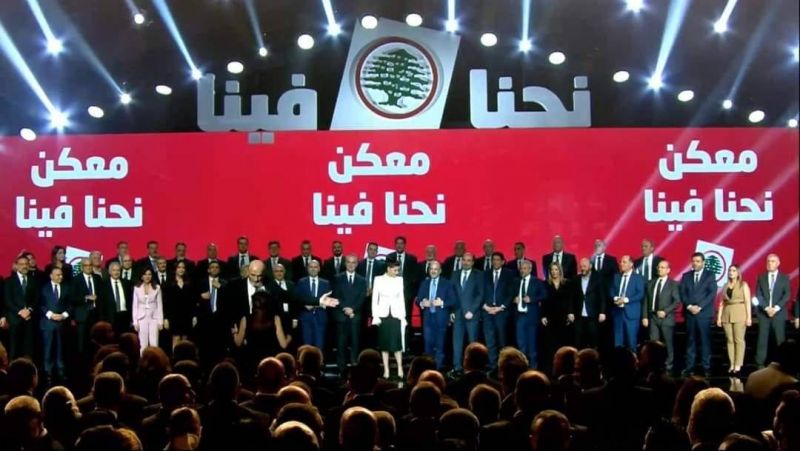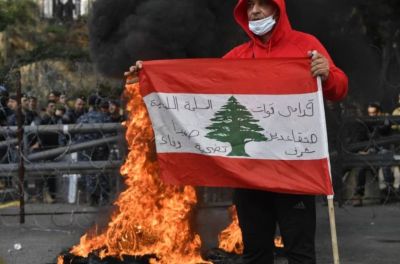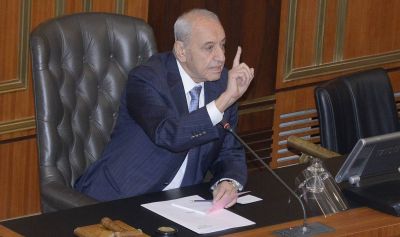
Lebanese Forces candidates for the 2022 legislative elections announce their party lists in Maarab on April 26, 2022. (Credit: NNA)
The leader of the Lebanese Forces (LF) has ample reason to feel content.
On Friday, Samir Geagea’s efforts to persuade Parliament to prolong Joseph Aoun's tenure as the head of the army were met with success.
This marked a rare triumph for the opposition camp, which, up to that point, had struggled to translate its gains in the May 2022 legislative elections into political capital.
Despite numerous obstacles, it seemed likely that the question of what to do about the army chief would be transferred from Parliament to cabinet.
Not only does cabinet lean toward the LF’s opponents, but its decisions are likely to be overturned by the State Council.
The LF, however, seized the opportunity presented by unprecedented international pressure to test both the Parliament Speaker Nabih Berri and the leader of the Free Patriotic Movement (FPM), Gebran Bassil. For once, the LF adeptly played the political game for once.
This raises questions about why Geagea is reluctant to play a similar game in the presidential deadlock issue, after more than a year without a Lebanese president.
‘Always an exception to the rules’
On the presidential issue, the LF, alongside the international community and the Maronite Church, are urging Berri to initiate an open electoral session. In this proposed session, voting rounds would continue until the next president is elected, aligning with the constitution.
The LF is also pushing for the process to result in the election of an independent and “reformist” president to counterHezbollah’s preferred candidate, Marada Movement leader Sleiman Frangieh, seen as a symbol of the political establishment. Firm in its conviction of the moral superiority of its stance, the LF has been showing very little flexibility.
Berri, however, has taken a step toward their position, at least superficially, by promising to convene a caucus, preceded by a dialogue lasting no more than seven days, in a bid to agree on a candidate.
Arguing that Berri cannot ask for a reward for fulfilling his constitutional duty and suspecting that this initiative is merely a manipulation, the LF adamantly rejected it.
The LF went as far as to instill fear in the minds of international envoys who dared to mention the word “dialogue.”
Consequently, Berri can now attribute the stalemate to them, especially in response to foreign diplomatic circles raising the specter of sanctions.
The LF was expected to show the same dogmatic rigidity on the extension of Aoun’s term in office, particularly since, constitutionally, legislating in the absence of a president is more challenging than initiating a week of inter-Lebanese dialogue. However, Geagea, backed once again by the international community and the Church, appeared determined this time to corner Berri.
The battle took on the appearance of a poker game between the two figures.
The LF’s Strong Republic bloc introduced a bill to extend the mandate of the army chief. The move surprised Berri, who had been attempting for over a year to persuade MPs to participate in a legislative session, to no avail.
Berri challenged them to a plenary session, to which the LF responded affirmatively.
He attempted to deter them by crafting an agenda where the amendment to the National Defense Act was buried within numerous articles, some of them highly controversial.
“We will be present at the meeting because there is an exception to all the rules,” said Geagea in a speech. Berri then urged caretaker Prime Minister Najib Mikati to convene cabinet in parallel with the plenary session.
Despite this, the LF managed to snatch a commitment from Berri that the article concerning the army chief army would indeed be debated in Parliament, irrespective of the outcome of the government meeting.
The LF did not stop there.
In an attempt to win over as many MPs as possible, the LF also agreed to support the extension of the term of office of General Imad Osman, head of the Internal Security Forces, as requested by the Sunni National Moderation bloc.
In the end, Berri held a legislative session he had been calling for, and Geagea managed to keep Aoun in office. A political game par excellence.
The advantages of playing politics
This is how, on Friday, Geagea made his grand return to the political arena.
Since the 2019 popular protest movement, the LF leader confined himself to the comfort of Parliament’s opposition. But now he appears to have joined the fray, establishing himself as a major political player. This time, he was the one being courted by all the political players.
Bassil, who is usually a force to be reckoned with and a fighter, seemed broken and isolated.
Geagea appears to have set himself up as the real commander-in-chief of the opposition.
On Wednesday, on the eve of the legislative session, he asserted that his allies — who were opting for filibustering — ended up playing his game.
Friday’s session proved him right, with MPs from the Kataeb and the Renewal bloc joining Parliament at the last minute when the debate on Aoun’s question was opened, to avoid a lack of quorum.
Barely two hours after this decisive vote, it was the LF leader who gave the victory speech, thanking his troops: “I salute the members of the opposition,” he said.
Has Geagea emerged from his inertia solely because of the international community's firm stance when it comes to keeping Aoun in office?
Or was this a turning point in Geagea’s strategy? If he had in any case decided to play Berri’s presidential game, he might have been able to call the speaker’s bluff by presenting him as being primarily responsible for the deadlock.
But if Berri’s initiative was truly made with the intention of electing a president, a head of state would have been chosen, in accordance with the constitution.
The president could even have been the choice of the opposition, with Friday’s session serving as a demonstration of that camp’s ability to unite around a figure, as was the case with Aoun.
A newly elected president could have appointed the senior officials of the army and the public administration.
In such a scenario, Geagea would not have found himself obliged to trample on his constitutional convictions.
This article was originally published in French in L’Orient-Le Jour. Translation by Sahar Ghoussoub

